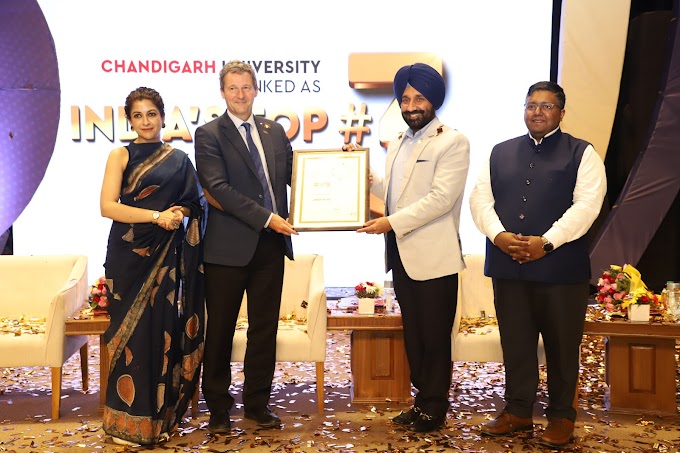Chandigarh University leverages emerging tech to transform into ‘smart university’
The higher education sector in India is no stranger to digital transformation; educational institutions have already embarked on their digital journeys. Chandigarh University is has taken several significant steps and is leveraging IT and digital solutions to facilitate an enhanced learning environment for students
One of India’s renowned universities, Chandigarh University, since its foundation, has been focusing technology-enabled education ecosystem, having an annual IT budget of Rs 11 crore. The university was recently in news for using 3D printing technology for designing ventilator splitters, in order to help the healthcare sector amidst the global COVID-19 crisis. Chandigarh University had also constituted a Core Research Group on the call made by Department of Science and Technology (DST) which had invited proposals from companies, universities and research institutions to derive technologically driven innovative solutions to the challenges caused by this crisis.
Sharing the university’s overarching focus, Dr. S S Sehgal, Executive Director, Engineering and Registrar, Chandigarh University, says, “We consider ourselves as a student centric university, which works in close association with the industry. We work for the student’s aspirations, which are not inclined towards the traditional mode of learning anymore. Students want the learning experience to be more participatory. Considering this, we want the learning experience to be more interesting for students.”
The university campus is spread over 130 acres, and offers around 129 programmes at undergraduate and postgraduate levels; whereas, there are 20 programmes at the PhD level. The entire administration of the university is divided into four clusters, because students from different programmes have unique expectations and they require different teaching models. The clusters include: engineering and computing, management, sciences, and law, arts and humanities. The university has also forayed into distance learning.
Providing an overview on how the university is equipped with IT and digital solutions, Dr. Sehgal says, “Even during the ongoing COVID-19 crisis, the university doesn’t face challenges in terms of technology readiness. Since its inception, Chandigarh University has its own ERP system called ‘Chandigarh University Information Management System’ (CUIMS), which has an integrated Learning Management System (LMS) into it. We have been using analytics for students’ performance and academic background. We also have introduced competency based education approach, wherein our career planning and development department handholds students to help develop upon their areas of weakness, with the help of technology.”
Backed by tech
With the help of industry collaboration, Chandigarh University has set up Technology Business Incubator (TBI), wherein it haa an additive manufacturing laboratory and 3D printing facility. The laboratory doesn’t just develop prototypes, but also conducts research. In the year 2018-19, Dr. Sehgal informs, Chandigarh University was ranked second in terms of number of patents by educational institutions in India. Along with CUIMS, the university also uses an inbuilt analytical tool. Using predictive analytics, it monitors students’ performance and areas of improvement.
Dr. Sehgal comments, “From parents’ point of view, education is an investment; and we strive to provide the best RoI. In collaboration with Aspiring Minds, we have provide a report to each student, based on their strengths and areas of improvement, and we focus on helping them overcoming the challenges during the course. This enhances their employability in a sign manner. Chandigarh University has also planned an augmented reality (AR) and virtual reality (VR) lab. We are working with Microsoft to set up such facility in the campus. In year 2013, Microsoft had started its innovation lab at Chandigarh University. As part of its focus, the AR and VR lab will provide an enhanced learning experience to students, and help increase the learning horizon for them. In addition to engineering programmes, the lab will also be a crucial element for design programmes.”
In the year 2013, Chandigarh University tied up with IBM and became the first university in India to start programmes on big data and analytics and information security. IBM tools and softwares are also shared with students who work on them.
Another key focus area for Chandigarh University is the application of automation into every process, especially in the admission process. As part of the automation drive, it introduced a chatbot to address frequently asked questions (FAQs). The university is working with IT company Virtusa in the area of robotic process automation (RPA) and have set up an RPA lab. On the lines of application of RPA, it is using the technology in student reporting mechanism.
Future of higher education
The university has a dedicated budget for research and development (R&D) and emerging technologies are a key focus, as part of which, Internet of Things (IoT) is a another critical focus area for Chandigarh University. It has tied-up with Intel for work on certain IoT devices. The university is also using IoT to monitor electricity consumption at campus. On the academic front, in the first every of all engineering programmes, there is a subject on the fundamentals of IoT and artificial intelligence (AI).
Elaborating further, Dr. Sehgal says, “Similarly, we have also included a subject on fundamentals of innovation and invention, through which, students learn to file for intellectual property patent rights in the first year of their course itself. We have Chandigarh University mobile application, and we are working on conducting mobile based practice sessions and tests for students. This year, we are also launching our community radio.”
Technologies such as AI, IoT and blockchain, Dr. Sehgal believes, will make a significant impact on the future on higher education in India. He says, “We must focus on real life applicability of AI in various fields and industry verticals. This year Chandigarh University has also started a bachelor of engineering programme in AI, which is a specially designed multidisciplinary programme. In order to create a Student Lifecycle Management System, we also want to integrate our LMS with certain softwares for assessment tasks. Our target is to transform Chandigarh University into a smart university and provide a digital experience to students and faculty.”





